|
|
|
Sort Order |
|
|
|
Items / Page
|
|
|
|
|
|
|
| Srl | Item |
| 1 |
ID:
140457
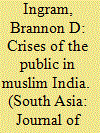

|
|
|
|
|
| Summary/Abstract |
This article argues that Sayyid Ahmad Khan (1817–98) and Ashraf ‘Ali Thanvi (1863–1943) were, respectively, exemplars of what I will call the liberal critique of custom on the one hand, and the Islamic legal critique of custom on the other. I argue that a range of overlapping semantic fields in their Urdu works—‘custom’ (rasm), ‘reform’ (islah), ‘decline’ (zawal, tanazzul) and ‘nation’ or ‘moral community’ (qawm), among others—opens up new lines of inquiry in comparing Aligarh and Deoband, typically treated as incommensurable in their views, as institutions and movements. I suggest, additionally, that ‘the public’ (‘amm) was a shared frame through which they envisioned implementing their respective projects. At the imagined centre of these publics, they located a new sort of Muslim: literate, self-regulating, self-fashioning, guided by rationality (‘aql) and free, above all, of the moral and social entanglements of ‘custom’.
|
|
|
|
|
|
|
|
|
|
|
|
|
|
|
|
| 2 |
ID:
103280
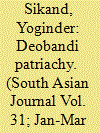

|
|
|
| 3 |
ID:
138243
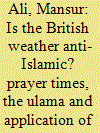

|
|
|
|
|
| Summary/Abstract |
In the absence of clear-cut guidance from the primary sources of the shari’a, how do Muslim scholars derive a workable religious praxis in changing circumstances and which authorities do they invoke in the process? This article explores possible answers to these questions by conducting a detailed analysis of a debate between two groups of Deobandi scholars in Britain over establishing the correct time for the commencement of morning (Fajr) and the onset of fasting for Ramadan. I argue that besides the primary sources, these Deobandi scholars invoke alternate forms of extrascriptural authority such as the weight of precedence deriving from the akabir (elders) of the Deobandi tradition, as also their reliance on modern scientific knowledge. The article highlights the complex interplay of factors which determines the way that Muslims in Britain negotiate the practice of their religion in new sociocultural milieu and the way they attempt to incorporate these changes within the parameters of an established religious discourse.
|
|
|
|
|
|
|
|
|
|
|
|
|
|
|
|
| 4 |
ID:
114015
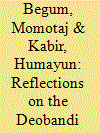

|
|
|
|
|
| Publication |
2012.
|
| Summary/Abstract |
During the British Raj, as part of an effort to reform the Muslim community through religious regeneration and in the absence of Muslim political power on the subcontinent, Islamic scholars (ulema) from the Darul Uloom Deoband seminary urged the setting up of separate institutions of religious education for Muslim women. The reformist discourse of the Deobandi ulema had, and still has, a profound influence on the pedagogy of madrasah education for women in South Asia, including Bangladesh. This study examines how Deobandi reformist ideals continue to be reflected in a non-government female madrasah in Bangladesh. The study provides an ethnographic account which illustrates the development of a sense of Muslim womanhood, rooted in ideas of moral guidance and the pious lifestyles of the female students of the madrasah. Madrasah education increases Muslim women's participation in religious institutions and forums, thereby heightening the possibility of a broader impact on religious life. Although madrasah education empowers female students to improve their religious consciousness, it has less impact on patriarchal ideology, which is deeply embedded in Bangladeshi society and culture.
|
|
|
|
|
|
|
|
|
|
|
|
|
|
|
|
| 5 |
ID:
147205
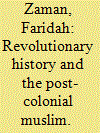

|
|
|
|
|
| Summary/Abstract |
This paper takes the ‘Silk Letters Conspiracy’, a complex, transnational scheme uncovered by British colonial officials in 1916, as the starting point for a discussion on the writing of revolutionary histories in post-colonial India. It considers the generally vexed position of Muslims in histories of early twentieth-century anti-colonialism and the lengths to which some scholars, particularly those associated with the Deoband seminary in northern India, have gone in response in order to create a counter-narrative of Muslim revolutionary anti-colonialism that was fully in keeping with the broader nationalist struggle. Later, the paper speculates on whether other historical lives, such as that of Abul Kalam Azad, one of the most high-profile Muslims in the leadership of the Indian National Congress in the 1940s and 1950s, could also be so re-inscribed and made part of the revolutionary script of the 1910s, and to what end this might be done. Throughout, this article meditates on the problematic nature of testimony, memory and the colonial archive.
|
|
|
|
|
|
|
|
|
|
|
|
|
|
|
|
|
|
|
|
|